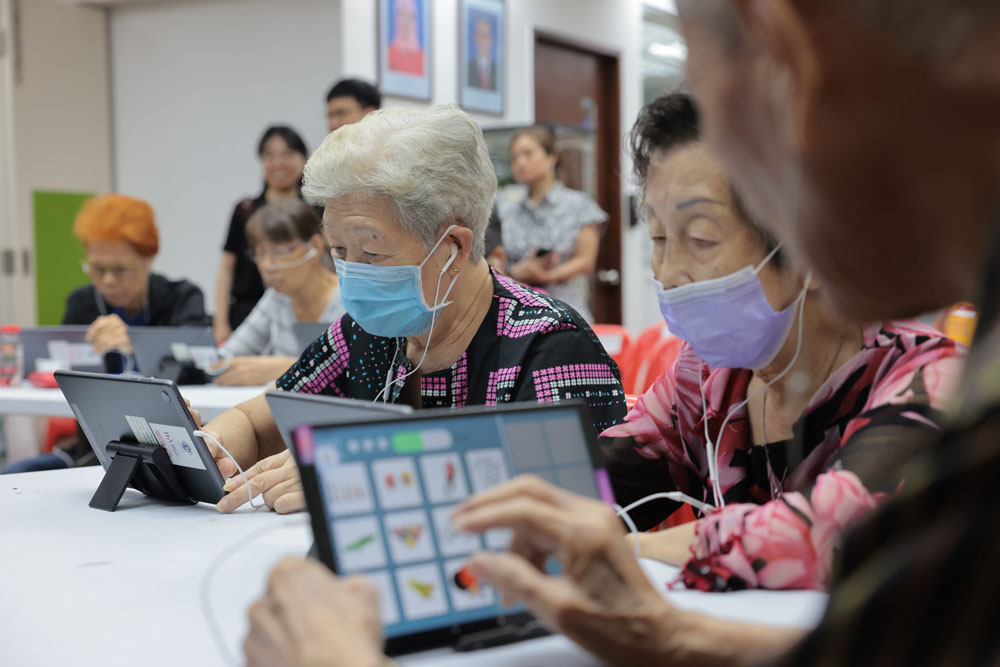SUTD Launches World’s First Bilingual Game App Aimed at Staving Off Dementia
Move over Super Mario and Candy Crush, Ami is set to take the game world by storm – for the mature audiences at least.

Ami, which is an acronym for Advancing Mental Invigoration, is a multi-lingual app that aims to help stave off dementia in seniors through gamification. Conceptualised by Singapore University of Technology and Design (SUTD) Acting Head of Humanities, Arts and Social Sciences, Associate Professor Yow Wei Quin, and her project team, Ami operates on the scientific hypothesis that bilingualism or multilingualism has positive effects on the cognitive abilities of the elderly.
According to Associate Professor Yow, a study of 105 cognitively healthy and cognitively impaired seniors (aged between 53 and 97) showed that seniors who played specially-designed cognitive games presented in two languages over two to three months, showed significant improvement in their cognitive skills and verbal memory, as compared to those who played monolingual games or none at all. Additionally, the cognitively impaired seniors showed an improvement in their early verbal learning skills six months after they last played the games. There was also a significant increase in perceived usefulness of technology and perceived ease of technology use, especially in the cognitively impaired seniors.

Ami, of which the prototype was launched today by Deputy Prime Minister Heng Swee Keat at the Lions Befriender’s Active Ageing Centre at Mei Ling Street, is a simple and elderly-friendly intervention tool that currently offers three touch-screen games in six different languages and dialects targeted at seniors who are cognitively healthy or exhibit early-to-moderate signs of dementia. These specially designed cognitive games are presented in single or dual-language modes and seniors who have played them have shown significant improvements in their cognitive skills and verbal memory. It includes an avatar that is named after personable names tailored to the various cultures (e.g., Amei, Aminah, Amitha) that the elderly can engage with to deliver instructions, prompts and assistance throughout the game.
Associate Professor Yow said: “SUTD created this bilingual app to leverage technology to stimulate confidence and independent play in the elderly. The study also allows us to test a scientific hypothesis on the cognitive advantages of bilingualism, specifically in this case, whether bilingual cognitive training is more effective than the traditional monolingual mode in improving the older adults’ cognitive abilities. Ami’s bilingual feature is so user-friendly -- even those who can’t read can play. It has also proven to stimulate the brain and improve verbal memory. We will continue to seek funding and investment for further translation of the app for a wider population, and eventually commercialise the app.”
Pilot testing and test-bedding of the app started two years ago in partnership with St Andrew’s Senior Care and Yong-En Care Centre. On top of the significant gains in cognitive outcomes and perception of technology, over 85% of the seniors who tested the game found the app enjoyable, easy to play and believed it was good brain exercise. Feedback garnered from a broad spectrum of people − caregivers, therapists, voluntary welfare organisations that focus on age-tech solutions, suggested that the app can be beneficial to their clients as well as help reduce care-givers’ burden.

Ms Betty Tan Siew Hua (陳秀华), 72, who has started playing the games, said: “I found the game to be interesting as the gameplay tests how fast my brain works and how quickly my fingers move, testing my flexibility and alertness. It also has multiple language options and I enjoy listening to the dialects as it is not common to hear them outside nowadays.”
Ms Chen Lu Fen, 61, one of the seniors who tested the Ami app, echoed these views. She said: “These games, of course, are helpful to older adults like me. It gives us lots of opportunities to exercise our brains and try our best to think. I found the middle game ('Speak'), in particular, a challenge for me.”
Following the successful pilot test, Ami was rolled out today in collaboration with Lions Befrienders (LBSA), whose programmes and services have benefitted and empowered more than 86,000 seniors since 1995. As part of the collaboration between SUTD and LBSA, Ami will be installed in LB’s IM-OK tablets (1,000 pieces) by December 2023. In the next phase of this project, the team aims to leverage on latest AI technologies to expand the features and repertoire of games, with the help of IceKredit Singapore, which is assisting in the development of the app.
Ms Karen Wee, Executive Director of Lions Befrienders, said: “Lions Befrienders is delighted to collaborate with SUTD and MOH on this joint endeavour. The Ami app will be a great extension to LB IM-OK customised tablets.”